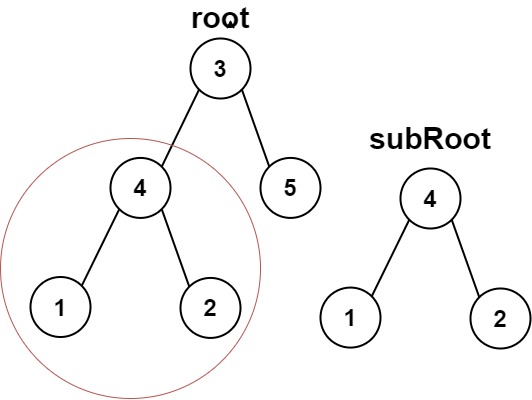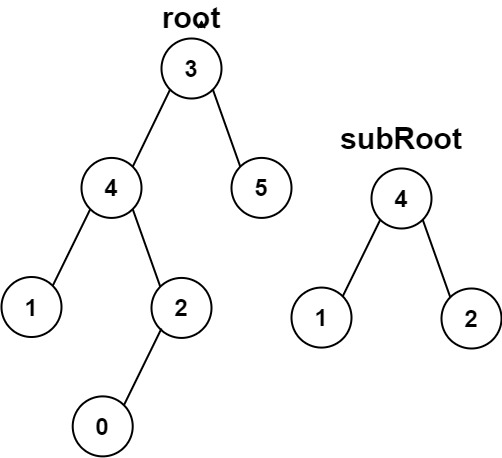572. Subtree of Another Tree
Description
Given the roots of two binary trees root and subRoot, return true if there is a subtree of root with the same structure and node values of subRoot and false otherwise.
A subtree of a binary tree tree is a tree that consists of a node in tree and all of this node’s descendants. The tree tree could also be considered as a subtree of itself.
Example 1:

- Input: root = [3,4,5,1,2], subRoot = [4,1,2]
- Output: true
Example 2:

- Input: root = [3,4,5,1,2,null,null,null,null,0], subRoot = [4,1,2]
- Output: false
Constraints:
- The number of nodes in the
roottree is in the range[1, 2000]. - The number of nodes in the
subRoottree is in the range[1, 1000]. - -104 <= root.val <= 104
- -104 <= subRoot.val <= 104
💡 Hint 1:
Which approach is better here- recursive or iterative?
💡 Hint 2:
If recursive approach is better, can you write recursive function with its parameters?
💡 Hint 3:
Two trees s and t are said to be identical if their root values are same and their left and right subtrees are identical. Can you write this in form of recursive formulae?
💡 Hint 4:
Recursive formulae can be: isIdentical(s,t)= s.val==t.val AND isIdentical(s.left,t.left) AND isIdentical(s.right,t.right)
Submitted Code
# Definition for a binary tree node.
# class TreeNode(object):
# def __init__(self, val=0, left=None, right=None):
# self.val = val
# self.left = left
# self.right = right
class Solution(object):
def isSubtree(self, root, subRoot):
"""
:type root: Optional[TreeNode]
:type subRoot: Optional[TreeNode]
:rtype: bool
"""
def isIdentical(t1, t2):
if not t1 and not t2: # 둘 다 None이면 같음
return True
if not t1 or not t2: # 둘 중 하나만 None이면 다름
return False
return t1.val == t2.val and \
isIdentical(t1.left, t2.left) and \
isIdentical(t1.right, t2.right)
# 큰 트리의 현재 노드가 None이면 비교 불가
if not root:
return False
# 큰 트리의 현재 노드와 작은 트리의 루트 값이 같다면 전체 구조 비교
if isIdentical(root, subRoot):
return True
# 구조가 달랐다면 큰 트리의 왼쪽 or 오른쪽 서브트리 중 일치하는 것이 있는지 다시 확인
return self.isSubtree(root.left, subRoot) or self.isSubtree(root.right, subRoot)
Runtime: 69 ms | Beats 86.11%
Memory: 14.00 MB | Beats 9.92%
isSubtree로 메인 트리를 순회하면서 두 노드가 동일한 트리인지 확인하는 isIdentical을 반복해서 검사하는 방법이다.
Other Solutions
1st
class Solution(object):
def isSubtree(self, root, subRoot):
def ser(n):
if not n:
return ',#'
return ',' + str(n.val) + ser(n.left) + ser(n.right)
return ser(subRoot) in ser(root)
time complexity: 𝑂(𝑛*𝑚) ← 각 트리의 노드 수
space complexity: 𝑂(𝑛+𝑚)
두 트리를 직렬화(serialize)해서 문자열로 표현한 뒤, subRoot가 root 안에 포함되는지 확인하는 방법이다. 각 노드끼리는 ,로 구분하고 만약 노드가 None일 경우 값 대신 #으로 대체해서 트리 구조를 유지했다.
root = [3,4,5,1,2]
subRoot = [4,1,2]
root
3
/ \ subRoot
4 5 4
/ \ / \
1 2 1 2
ser(root) = ,3,4,1,#,#,2,#,#,5,#,#
ser(subRoot) = ,4,1,#,#,2,#,#
return True



Leave a comment